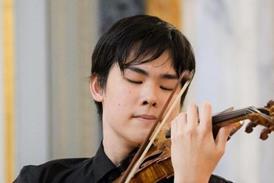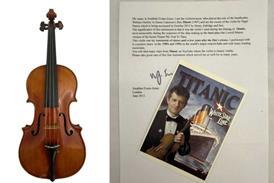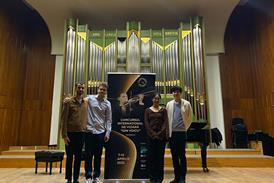The cellist shares how the theme of love sets the tone for his latest album with pianist Marianna Shirinyan, featuring works and transcriptions of Schubert, Robert and Clara Schumann, Brahms and Richard Strauss

Discover more Featured Stories like this in The Strad Playing Hub
Schubert’s ‘An die Musik’ is the inspiration behind your new album. Can you tell us about how the theme of love is evident in your programming?
It is of course highly personal and subjective but this short song by Schubert totally hit us with its unique message and emotional content. It has so much of what love in life is about - vulnerability and tenderness expressed in a very private and humble way, as only Schubert can. And this he manages to do in just three minutes, which is remarkable!
That song and that feeling got us going and the natural next step was to present the famous ‘trio’ - Robert and Clara Schumann and Johannes Brahms, and their intense relationships musically but also on a personal level.There is no doubt that the love between them all highly affected many of their compositions. Here in the pieces on the album (especially in Brahms’s Scherzo and Robert’s Violin Sonata) the expression is much more passionate than in the Schubert song, but still extremely valid, intimate and essential.
You’ve transcribed several works from other instruments to cello and piano for this album. What were some of the challenges in this process? Have you transcribed many works before?
I haven’t done many transcriptions in my life but on this album it felt urgent to me. I, of course, always try to be as true to the original score as possible but equally true to how to perceive and imagine the essence of the mood of the piece. To capture different colours, dark and bright nuances with different overtones is essential, I feel and those things mainly affect which octave I decide to play in. It’s a little like cooking; tasting, seasoning, tasting etc. In the end hopefully the results will be in the mood of the composer.
What is it about this repertoire that made you want to transcribe for cello and piano?
With the three songs on the album, I just feel that the cello is so unbelievably close to the human voice that it’s completely natural to play them on the cello. It’s a bit of a cliché but it’s really true! The Scherzo by Brahms I heard quite recently being played on the viola and I really liked the darker colour that came out of that version, so I immediately decided to play it on my cello.
The Schumann Violin Sonata has been one of my favourite pieces for a long time, when I heard it with Argerich/Kremer live in Stockholm so I simply couldn’t resist playing it! I strongly believe that truly genius music can handle many ways of approach and treatment. Then we of course needed Clara to join the party with Robert and Johannes, so to play her Romances for cello and piano came very naturally.
Finally, what’s a standout piece for you from this album?
My personal recommendation from this album is the Robert Schumann Violin Sonata, particularly the first movement.
An die Musik by cellist Torleif Thedéen and pianist Marianna Shirinyan will be released on LAWO Classics on 31 May 2024.
Read: Right-arm eloquence: the Germanification of cellist Beatrice Harrison
Read: Masterclass: Torleif Thedéen on the Lalo Cello Concerto
Discover more Featured Stories like this in The Strad Playing Hub
The number one source for playing and teaching books, guides, CDs, calendars and back issues of the magazine.
In The Best of Technique you’ll discover the top playing tips of the world’s leading string players and teachers. It’s packed full of exercises for students, plus examples from the standard repertoire to show you how to integrate the technique into your playing.
The Strad’s Masterclass series brings together the finest string players with some of the greatest string works ever written. Always one of our most popular sections, Masterclass has been an invaluable aid to aspiring soloists, chamber musicians and string teachers since the 1990s.
American collector David L. Fulton amassed one of the 20th century’s finest collections of stringed instruments. This year’s calendar pays tribute to some of these priceless treasures, including Yehudi Menuhin’s celebrated ‘Lord Wilton’ Guarneri, the Carlo Bergonzi once played by Fritz Kreisler, and four instruments by Antonio Stradivari.






































No comments yet